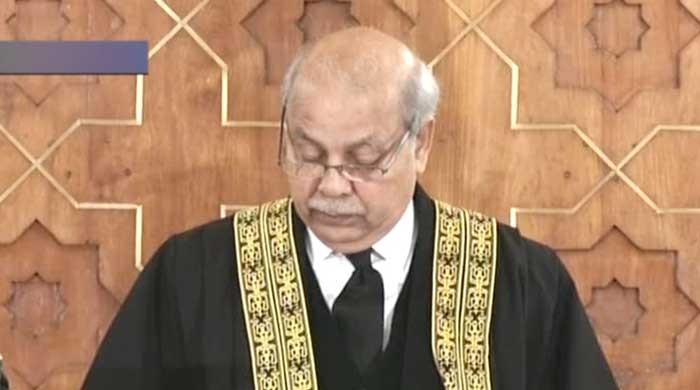Profile: Chief Justice Gulzar Ahmed
 Justice Gulzar Ahmed was a part of the bench which disqualified former prime minister Nawaz Sharif in the Panama Papers case. Photo: Geo News
Justice Gulzar Ahmed was a part of the bench which disqualified former prime minister Nawaz Sharif in the Panama Papers case. Photo: Geo News
Justice Gulzar Ahmed, who was sworn in as the 27th chief justice of Pakistan on Saturday, was born in Karachi on February 2, 1957.
Hailing from the family of distinguished lawyer Noor Muhammed, Justice Ahmed received his early education from Gulistan School, did his bachelors from Government National College, and completed his bachelor of laws (LLB) from SM Law College.
According to the Supreme Court website, he "enrolled as an advocate on January 18, 1986 and as an advocate of the High Court on April 4, 1988, and then as an advocate of the Supreme Court of Pakistan on September 15, 2001".
Furthermore, he was "elected as an honorary secretary of the Sindh High Court Bar Association for the year 1999-2000".
A bulk of Justice Ahmed's legal practice focused on the civil corporate side, during which time he was a "legal advisor to various multinational and local companies, banks and financial institutions".
On August 27, 2002, Justice Ahmed was elevated as a judge of the Sindh High Court. Simultaneously, he remained a member of the board of governors of several universities, including the Institute of Business and Technology, NED University of Engineering and Technology, Sir Syed University of Engineering and Technology, Iqra University, Ahmed E.H. Jaffer Foundation and Agha Khan University.
In 2009, according to the Supreme Court website, Justice Ahmed attended a study tour for Pakistani judicial officials on “International Cooperation in Terrorist Cases”, sponsored by the United Nations Office on Drug and Crime at Vienna, Bonn and Berlin.
On February 2011, Justice Ahmed was elevated as a senior puisne judge of the Sindh High Court. Later that year on November 16, he was appointed a judge of the Supreme Court.
He is also a member of the Supreme Judicial Council as well as the Judicial Commission of Pakistan.
Justice Ahmed has twice served as the acting chief justice of Pakistan from November 20, 2018, to November 28, 2018, and May 13, 2019, to May 17, 2019.
Major rulings and remarksJustice Ahmed was a member of the five-member Supreme Court bench that disqualified former prime minister Nawaz Sharif in the Panama Papers case. He had penned a dissenting note in the case’s split verdict.
He was also part of the five-member Supreme Judicial Council (SJC) bench that heard the references filed against Supreme Court judge Justice Qazi Faez Isa and Sindh High Court (SHC) Judge KK Agha.
Justice Ahmed was also part of the two-judge bench which ordered that Karachi be restored to how it was 40 years ago. In his decision on January 22, 2019, alongside Justice Sajid Ali Shah, Justice Ahmed had directed authorities to demolish unlawful constructions around the metropolis.
Justice Ahmed during the hearing had issued orders barring the use of residential houses for commercial purpose and had said “Do whatever but implement court orders.If the orders are not implemented then we will ask DG Sindh Control Building Authority (SCBA) Iftikhar Qaimkhani to pack up.”
The top judge in a decision on May 9, 2019, had ordered the removal of encroachments on railway land and to restore the Karachi Circular Railway.
“Those who have established illegal settlements have all kinds of weapons. We have the army and Sindh Rangers, use them,” Justice Ahmed had said.
Just before he took as over as next chief justice of the country, Justice Gulzar on November 18, had barred the federal government from purchasing the lands of Pakistan Steel Mills (PSM), saying that it is "the people’s land".
“The production of Steel Mills stands at zero,” Justice Ahmed had remarked. “The government has destroyed the entity to fill its own pockets.”


Post a Comment